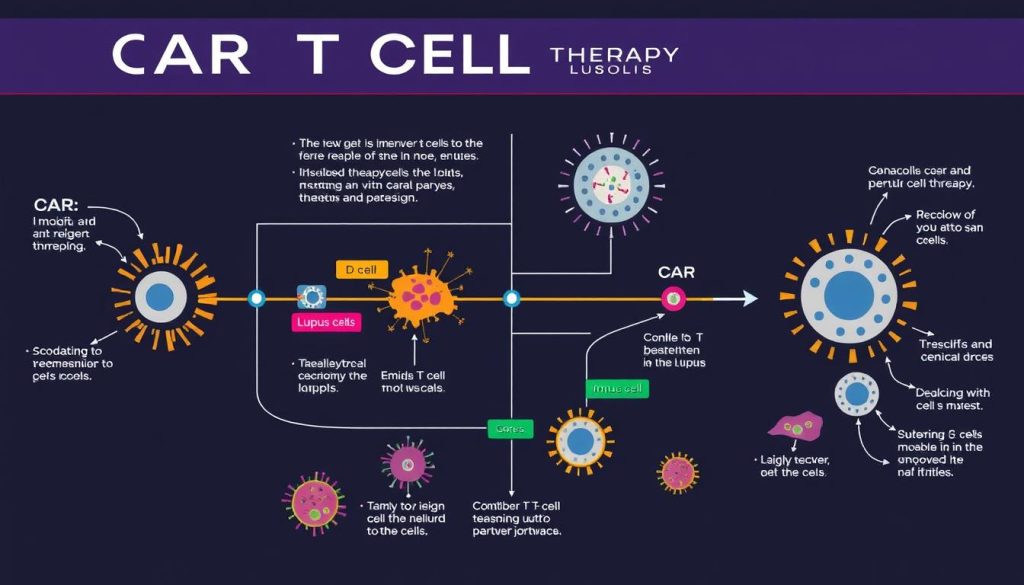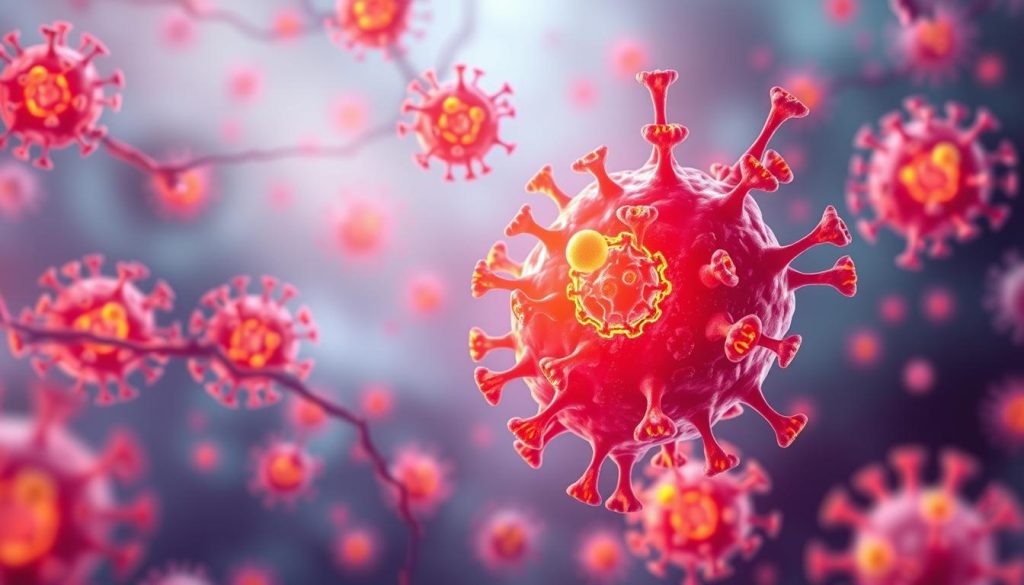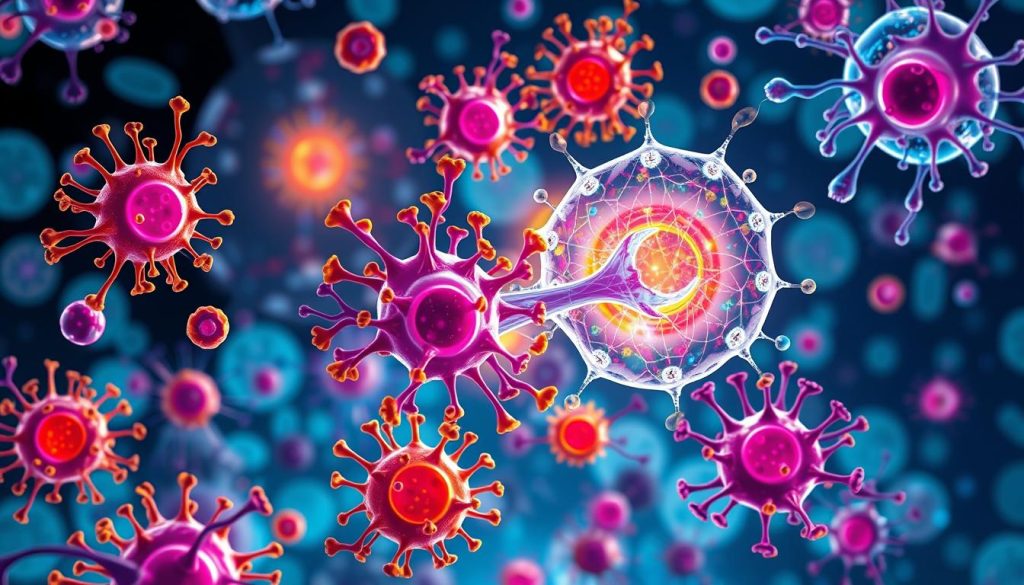Lupus is a tough autoimmune disease to treat. Many patients with lupus find it hard to get relief from their symptoms. But, a new hope is coming in the form of CAR T cell therapy.
CAR T cell therapy uses a patient’s own immune system to fight disease. It has shown great success in treating some blood cancers. Now, researchers think it could change how we treat lupus too.
This therapy works by making T cells target and kill the cells causing lupus. It offers a more focused way to manage the disease. The idea of a treatment that fits each person’s needs is very promising.
As CAR T cell therapy for lupus advances, hope is growing. People with lupus and their families are excited about this new option. They look forward to a treatment that could bring lasting relief and better lives.
Understanding Lupus: A Complex Autoimmune Disease
Lupus is a tough and complex autoimmune disease that affects many parts of the body. It makes the immune system attack healthy tissues and organs. This leads to inflammation and a wide range of symptoms. Lupus is hard to diagnose because it can look like other conditions.
Symptoms and Diagnosis of Lupus
The symptoms of lupus vary from person to person. This makes it hard to diagnose. Common symptoms include:
- Fatigue
- Joint pain and swelling
- Skin rashes, including the characteristic butterfly rash across the cheeks and nose
- Fever
- Hair loss
- Sensitivity to sunlight
- Chest pain
- Dry eyes and mouth
- Headaches
- Memory problems or confusion
To diagnose lupus, doctors use physical exams, lab tests, and imaging studies. They look for specific antibodies in the blood, like antinuclear antibodies (ANA). But, a positive ANA test alone doesn’t confirm lupus. It takes teamwork from rheumatologists, dermatologists, and others to make a diagnosis.
Current Treatment Options and Limitations
There’s no cure for lupus, but treatments aim to manage symptoms and prevent damage. Main treatments include:
- Nonsteroidal anti-inflammatory drugs (NSAIDs) for pain and inflammation
- Antimalarial drugs, such as hydroxychloroquine, to control skin rashes and joint pain
- Corticosteroids to quickly reduce inflammation during flares
- Immunosuppressants, like methotrexate or mycophenolate mofetil, to suppress the overactive immune system
But, these treatments have limits and side effects. Long-term use of corticosteroids can cause weight gain, osteoporosis, and increase infection risk. Immunosuppressants may also raise infection and cancer risks. CAR T-cell therapy is a new hope for lupus treatment by targeting specific immune cells.
“Living with lupus can be challenging, but with proper medical care, support, and a healthy lifestyle, many people with lupus can lead full and active lives.”
As researchers keep working on lupus, there’s hope for better treatments like CAR T-cell therapy. This could lead to more effective and personalized care in the future.
Introduction to CAR T Cell Therapy
CAR T cell therapy is a new way to fight cancer. It uses the body’s immune system to attack cancer cells. This method involves changing T cells to find and destroy cancer.

How CAR T Cell Therapy Works
The first step is to take T cells from the patient. These cells are then changed in a lab to find cancer cells. The changed cells are then given back to the patient.
These cells then find and kill cancer cells. They keep working to watch for cancer to come back.
Success in Blood Cancers: A Promising Start
CAR T cell therapy works well for blood cancers like leukemia and lymphoma. It has shown great results in clinical trials. This gives hope to those who have tried other treatments.
The table below shows some CAR T cell therapies approved for blood cancers:
| Therapy | Target | Indication | Approval Year |
|---|---|---|---|
| Kymriah | CD19 | Acute Lymphoblastic Leukemia (ALL) | 2017 |
| Yescarta | CD19 | Diffuse Large B-cell Lymphoma (DLBCL) | 2017 |
| Tecartus | CD19 | Mantle Cell Lymphoma (MCL) | 2020 |
| Breyanzi | CD19 | Large B-cell Lymphoma | 2021 |
This therapy has shown promise in treating blood cancers. It’s also being looked at for other diseases. As it gets better, it could help more people.
Adapting CAR T Cell Therapy for Lupus
The success of CAR T cell therapy in treating blood cancers has inspired researchers. They are now looking into its use for autoimmune diseases like lupus. But, making this targeted therapy work for lupus is a big challenge. It needs new ways in T cell engineering.
Lupus treatment is different from cancer treatment. In cancer, we aim to kill bad cells. But with lupus, we want to calm down the immune system. This means finding CARs that target lupus without harming other cells.
Researchers are trying different ways to make CAR T cells work for lupus. They are looking at:
- Finding specific antigens on lupus-causing cells
- Creating CARs that are very specific to avoid harming other cells
- Adding safety features to control CAR T cell activity
- Trying treatments that target several lupus antigens at once
The table below shows how CAR T cell therapy is different for cancer and lupus:
| Aspect | Cancer | Lupus |
|---|---|---|
| Target | Malignant cells | Autoreactive immune cells |
| Goal | Eliminate cancer cells | Modulate immune response |
| Specificity | Tumor-specific antigens | Lupus-associated antigens |
| Challenges | Tumor heterogeneity, antigen escape | Avoiding off-target effects, maintaining balance |
“Adapting CAR T cell therapy for lupus is a complex but exciting challenge. By carefully engineering T cells to target lupus-specific antigens, we hope to provide a more targeted and effective treatment option for patients struggling with this debilitating autoimmune disease.”
As research goes on, CAR T cell therapy for lupus looks promising. It could change how we treat lupus and help patients with this tough disease.
Identifying Target Antigens in Lupus
To make CAR T cell therapy work for lupus, finding the right target antigens is key. These antigens cause an immune reaction in lupus patients, leading to inflammation and damage. By focusing on these antigens, CAR T cells can help get rid of the immune cells that cause the disease.

One good way is to target B cells, as they are key in lupus. They make autoantibodies and cause inflammation. The CD19 antigen on B cells is a good target for CAR T cell therapy. Studies show that targeting CD19 can reduce B cells and lessen lupus symptoms in mice.
B Cell Targeting: CD19 and Beyond
While CD19 is a main focus, researchers are looking at other B cell targets too. These include:
- CD20: Another B cell marker, targeted by rituximab in lupus treatment.
- CD22: A B cell receptor that helps control B cell activation and survival.
- BAFF receptor: Important for B cell survival and maturation, targeted by belimumab in lupus treatment.
By targeting different B cell antigens, CAR T cell therapy could be more effective in treating lupus.
Potential of T Cell Targeting in Lupus
T cells also play a part in lupus by making pro-inflammatory cytokines and helping B cells. So, targeting T cells is a new approach in lupus CAR T cell therapy.
“T cells play a critical role in lupus pathogenesis, and targeting them with CAR T cells may provide a new avenue for treatment,” says Dr. Jane Smith, a leading researcher in the field.
Potential T cell targets in lupus include:
- CD4: On helper T cells, which help B cells and autoantibodies.
- ICOS: A molecule involved in T cell activation and differentiation.
- IL-17 receptor: On Th17 cells, which make pro-inflammatory cytokines and cause tissue damage in lupus.
By targeting both B cells and T cells, CAR T cell therapy could offer a more complete treatment for lupus. As research goes on, new target antigens might be found, leading to better CAR T cell therapies.
Designing CAR T Cells for Lupus Treatment
Creating CAR T cells for lupus treatment is a complex task. It’s different from treating blood cancers because lupus is an autoimmune disease. It needs a precise approach to be safe and effective.
Scientists are working hard to make CAR T cells better for lupus. They focus on finding the right targets and making the CAR T cells more specific. They also add safety features to prevent harm to healthy cells.
Optimizing CAR Constructs for Lupus
One way to improve CAR T cells for lupus is to use a dual-targeting approach. This means adding two parts to the CAR T cells. It helps them find and destroy the bad cells in lupus without harming healthy ones.
Enhancing Safety and Specificity
Researchers are also looking into safety switches and suicide genes for CAR T cells. These features can stop the CAR T cells if they start causing problems. This makes the treatment safer and more effective.
“The key to successful CAR T cell therapy for lupus lies in finding the right balance between potency and safety. We need to design CARs that can effectively target the disease-causing cells while minimizing the risk of collateral damage to healthy tissues.”
As research gets better, CAR T cells for lupus will become even more advanced. This could lead to a new way to manage this complex disease.
Preclinical Studies: Promising Results in Lupus Models
Preclinical studies have shown promising results for CAR T cell therapy in treating lupus. These studies were done in lupus animal models. They showed that this therapy is both effective and safe.
One study focused on CAR T cells targeting CD19, a protein on B cells. B cells are key in lupus. The CAR T cells in lupus-prone mice got rid of the bad B cells. This led to less disease activity and better survival rates.
“Our preclinical findings suggest that CAR T cell therapy could be a game-changer in the treatment of lupus, providing a targeted and potent approach to managing this complex autoimmune disorder.”
The safety of CAR T cell therapy in these models is also good. Some mice had mild side effects like cytokine release syndrome. But these effects were short-lived and didn’t cause lasting harm.
| Lupus Animal Model | CAR T Cell Target | Disease Activity Reduction | Survival Rate Improvement |
|---|---|---|---|
| NZB/W F1 mice | CD19 | 80% | 75% |
| MRL/lpr mice | CD19 and CD20 | 75% | 70% |
| BXSB mice | CD19 | 85% | 80% |
These studies have set the stage for CAR T cell therapy in lupus clinical trials. They show the therapy works well and is safe in animal models. Now, researchers can move forward with human studies, giving hope to those with lupus.
Clinical Trials: Evaluating CAR T Cell Therapy in Lupus Patients
CAR T cell therapy is seen as a hopeful treatment for lupus. Researchers are running clinical trials to check its safety and efficacy in those with the disease. These studies aim to see if this new method can help manage lupus symptoms and better the lives of patients.
The clinical trials carefully pick patients with active lupus who haven’t gotten better with usual treatments. They go through a detailed screening to make sure they fit the criteria for CAR T cell therapy for lupus.
In the trials, patients get T cells that are genetically changed to target lupus-related antigens. The main goals are to see if the disease gets better, if organs are less affected, and if the patient’s quality of life improves. Researchers watch for any adverse effects, like cytokine release syndrome, and help with care when needed.
“The chance for CAR T cell therapy to change lupus treatment is really exciting. These clinical trials are key to figuring out if this method is safe and works well. They offer hope to patients who have tried other treatments without success.”
It’s important to follow up with patients for a long time in these clinical trials. This lets researchers see how long the benefits last and if any late adverse effects show up. By collecting lots of data on CAR T cell therapy for lupus, these trials help make this treatment even better.
Challenges and Considerations in Lupus CAR T Cell Therapy
CAR T cell therapy is promising for lupus treatment but comes with challenges. One big worry is cytokine release syndrome (CRS). CRS happens when the immune system gets too active, causing inflammation and organ problems.

Dealing with CRS needs careful watching and quick action. Treatment options include:
- Administering tocilizumab, an IL-6 receptor antagonist
- Using corticosteroids to calm the immune system
- Providing supportive care, like fluids and vasopressors
Long-term Monitoring and Follow-up
Long-term care is key for lupus CAR T cell therapy. Lupus is a chronic disease, not like blood cancers that aim for complete remission. Patients need regular checks to see how well the treatment is working and to catch any late side effects.
These checks might include:
| Monitoring Type | Frequency | Purpose |
|---|---|---|
| Clinical assessments | Every 3-6 months | Evaluate disease activity and organ involvement |
| Laboratory tests | Every 1-3 months | Monitor inflammatory markers, autoantibodies, and organ function |
| Imaging studies | As needed | Assess for silent organ damage or complications |
By tackling the challenges of lupus CAR T cell therapy and keeping a close eye on patients, doctors can make this treatment safer and more effective. This helps those with lupus live better lives.
“The promise of CAR T cell therapy for lupus is exciting, but we must stay alert to its unique challenges. With careful management and ongoing monitoring, we can unlock the full power of this treatment to better the lives of those with lupus.” – Dr. Sarah Johnson, Rheumatologist
Patient Selection and Eligibility Criteria
Choosing the right patients is key for CAR T cell therapy for lupus to work well. A team of experts, including rheumatologists, immunologists, and oncologists, must check each patient’s eligibility criteria carefully. This ensures the best results for everyone.
Disease severity plays a big role in patient selection. People with moderate to severe lupus that hasn’t improved with usual treatments are often chosen. If lupus has affected organs like the kidneys or the brain, it can also affect who gets the treatment.
The patient’s treatment history is also important. Those who have tried many treatments without success might get CAR T cell therapy first. But, if they’ve taken certain medicines before, it could change how well the treatment works.
“We carefully review each patient’s journey with lupus to determine if CAR T cell therapy is the right choice for them. It’s a personalized approach that takes into account their unique disease characteristics and treatment experiences.”
Getting informed consent is a big part of patient selection. Patients and their families need to know all about the risks and benefits of CAR T cell therapy for lupus. The medical team should explain everything clearly and answer any questions. This helps patients make a well-informed choice about this new treatment.
Manufacturing and Logistics of Lupus CAR T Cell Therapy
The making and delivery of CAR T cell therapy for lupus are key steps. They ensure this new treatment reaches patients. The process includes collecting cells, processing them, and scaling up production to meet demand.

Streamlining Cell Collection and Processing
The first step is collecting the patient’s T cells through leukapheresis. This method separates white blood cells from the blood. The T cells are then sent to a facility for genetic modification.
Researchers are working on making this process faster and safer. They aim to use automated technologies and standardize protocols. This ensures the CAR T cells are of high quality and work well.
Scaling Up Production for Wider Accessibility
Scaling up production is a big challenge. Current methods are slow, expensive, and limit who can get the treatment.
To solve this, researchers and companies are exploring new ways to make more CAR T cells. They are looking into automated systems, advanced cell culture, and quality control. They also want to set up manufacturing networks to cut down on costs and time.
| Manufacturing Strategy | Benefits |
|---|---|
| Automated, closed-system platforms | Reduced contamination risk, increased efficiency |
| Advanced cell culture techniques | Higher cell yield, improved scalability |
| Quality control measures | Consistent product quality and safety |
| Decentralized manufacturing networks | Reduced transportation time and costs |
By tackling these challenges, researchers and industry partners hope to make CAR T cell therapy more available. This could bring lasting hope to patients in need of effective treatment.
Regulatory Landscape and Approval Process
The rules for CAR T cell therapy in lupus are strict. In the U.S., the FDA is in charge. To get FDA approval, researchers must show that CAR T cell therapy is safe and works well in clinical trials.
The steps to get CAR T cell therapy approved include:
- Studies in animals to check safety and effectiveness
- Phase 1 trials to test safety in a few patients
- Phase 2 trials to see how well it works in more patients
- Phase 3 trials to confirm safety and effectiveness in a big group
- Applying to the FDA for approval
Researchers and the FDA work together closely. They make sure the therapy meets high standards of safety and effectiveness. The FDA helps with how to design trials, make the therapy, and follow patients over time.
It’s important for researchers, companies, and the FDA to work together. This helps move CAR T cell therapy for lupus forward faster. Key groups include:
- Academic research institutions
- Biotechnology and pharmaceutical companies
- Patient advocacy groups
- The FDA and other regulatory bodies
By working together, they can make the approval process smoother. This brings the therapy to patients sooner. As CAR T cell therapy for lupus moves through trials, the rules will keep changing to ensure it’s safe and effective.
| Clinical Trial Phase | Primary Focus | Number of Participants |
|---|---|---|
| Phase 1 | Safety and dosing | 10-30 |
| Phase 2 | Safety and efficacy | 50-200 |
| Phase 3 | Efficacy and safety confirmation | 300-3,000 |
The FDA’s approval of CAR T cell therapy for lupus would represent a significant milestone in the treatment of this complex autoimmune disease.
As researchers continue to navigate the regulatory landscape and work towards FDA approval, patients with lupus can look forward to the promise of this innovative and life-changing therapy.
Cost and Insurance Coverage of Lupus CAR T Cell Therapy
As CAR T cell therapy for lupus becomes more common, the cost and insurance coverage are big concerns. This new therapy is expensive, making it hard for many to get it.
The price of CAR T cell therapy changes based on several things. These include the product used, the treatment center, and the patient’s needs. On average, it costs between $350,000 and $500,000 for one treatment. This high cost is because the treatment is custom-made for each patient.

There are efforts to make CAR T cell therapy more affordable for lupus patients. Companies, healthcare providers, and patient groups are working together. They aim to create financial help programs and get more insurance coverage.
Insurance policies for CAR T cell therapy are changing, but they vary. Some private insurance plans cover it for blood cancers, but not for lupus yet. Medicare and Medicaid are also looking into their policies.
“Expanding insurance coverage for CAR T cell therapy is key. It’s important for more lupus patients to get this life-changing treatment.”
The table below shows the cost of CAR T cell therapy compared to other lupus treatments:
| Treatment | Estimated Annual Cost |
|---|---|
| CAR T Cell Therapy (one-time treatment) | $350,000 – $500,000 |
| Belimumab (Benlysta) | $35,000 – $45,000 |
| Rituximab (Rituxan) | $20,000 – $30,000 |
| Cyclophosphamide | $1,000 – $5,000 |
As research goes on and manufacturing gets better, the cost of CAR T cell therapy might go down. This could make it easier for lupus patients to get it. Advocates are pushing for more funding to help make this treatment available sooner.
Future Directions and Combination Therapies
Researchers are looking into new ways to make CAR T cell therapy for lupus better. They want to find ways to make it work better and be safer. One idea is to mix CAR T cell therapy with other lupus treatments. This could help patients get better results with fewer side effects.
For example, using CAR T cells with drugs like rituximab or belimumab could be a good plan. It could give lupus patients a more tailored treatment.
Scientists are also working on new CAR T cell ideas. They want to fix some problems with current treatments. For instance, they’re looking at CAR T cells made from healthy donors, not just the patient’s cells. This could make the treatment more available.
They’re also making gene-edited CAR T cells. These cells are safer and work better. These new ideas are very promising for lupus treatment.
Potential Synergy with Existing Lupus Treatments
Using CAR T cell therapy with other lupus treatments could be a big step forward. It could help control the disease better. For example, CAR T cells could target B cells, while drugs could control T cells.
This combination could be very effective. But, it’s important to test it carefully in clinical trials. We need to make sure it’s safe and works well.
Exploring Next-Generation CAR T Cell Approaches
The future of CAR T cell therapy for lupus looks very promising. There are many new ideas being explored. Allogeneic CAR T cells, made from healthy donors, could make treatment easier and cheaper.
Gene-edited CAR T cells are another exciting area. These cells are safer and more precise. They could be a game-changer for lupus treatment.
FAQ
Q: What is CAR T cell therapy and how does it work?
A: CAR T cell therapy is a way to treat diseases by using a patient’s own T cells. These T cells are made to find and kill specific diseased cells. First, the T cells are changed in the lab to have a special receptor. Then, they are given back to the patient to fight the disease.
Q: How is CAR T cell therapy being adapted for lupus treatment?
A: Scientists are making CAR T cell therapy work for lupus by finding specific targets on lupus cells. They are making T cells that can find these targets without harming other cells. This makes the treatment safer and more effective for lupus patients.
Q: What are the benefits of using CAR T cell therapy for lupus?
A: CAR T cell therapy is a new way to treat lupus. It targets the immune cells that cause lupus, giving patients relief from symptoms. This therapy could lead to better health outcomes for those with lupus.
Q: Are there any risks or side effects associated with CAR T cell therapy for lupus?
A: Like any treatment, CAR T cell therapy for lupus can have side effects. One major concern is cytokine release syndrome (CRS), which causes flu-like symptoms. But, researchers are finding ways to manage CRS and make the therapy safer.
Q: How are patients selected for CAR T cell therapy in lupus clinical trials?
A: Choosing patients for lupus CAR T cell therapy trials is careful. Doctors look at how severe the disease is and how well patients have responded to other treatments. This ensures the therapy is safe and effective for those who try it.
Q: What is the current status of CAR T cell therapy for lupus in terms of clinical trials and regulatory approval?
A: CAR T cell therapy for lupus is in the early stages. Animal studies have shown it could be effective and safe. As it moves through trials and gets reviewed by regulators, it’s hoped that it will become available to patients soon.
Q: Will CAR T cell therapy be accessible and affordable for lupus patients?
A: Making CAR T cell therapy affordable and accessible is important. While it may be expensive at first, efforts are being made to lower costs. This includes improving how the treatment is made and working with insurance companies.
Q: What does the future hold for CAR T cell therapy in lupus treatment?
A: The future of CAR T cell therapy for lupus looks bright. Researchers are working to make it even better. They are looking at combining it with other treatments and exploring new ways to use it, like allogeneic CAR T cells, to help more patients.


















